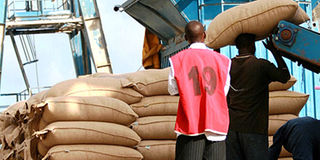Maize imports to plug deficit of 18m bags: Report

Workers loading imported maize at the Mombasa port in the past. Kenya will be forced to rely on maize imports beginning July due to an impending shortage of 18 million bags, a new study shows. Photo/FILE
What you need to know:
- Although the country is considered an agricultural economy, it is a net maize importer as it produces about 30 million bags of the grain yearly against consumption of 42 million bags.
Kenya will be forced to rely on maize imports beginning July due to an impending shortage of 18 million bags, a new study shows.
Conducted by the Ministry of Agriculture in February, the survey projected national maize availability as at July 2014 to be 16.6 million bags of 90 kilogramme capacity.
Based on the current consumption rate of 3.72 million bags of maize monthly, 18.6 million bags will be required to take the country to the next harvesting season that starts in October.
“The deficit is expected to be bridged through imports by the private sector from the EAC countries,” said the report, adding that the ongoing rains would increase available vegetables and potatoes in the market by next month.
According to the report, maize stocks in the country between March and July are projected at 19.1 million bags but poor post-harvest handling could reduce them by 10 per cent.
An estimated 1.9 million bags are set to go bad while another 383,000 bags will go into manufacturing feeds and other industrial use. Some 91,000 bags will be used for seed production.
Although the country is considered an agricultural economy, it is a net maize importer as it produces about 30 million bags of the grain yearly against consumption of 42 million bags.
Kenya relies on imports from East Africa, Malawi, and Zambia.
However, Malawi and Zambia have banned exports due to acute shortages that were occasioned by bad weather, according to the United Nation’s Food and Agriculture Organisation.
This means that Kenya will rely only on East Africa to get the grain.
Millers have, however, started cautioning on increase in prices of flour as they estimate that there will be a maize deficit of 10 million bags.
The Kenya Cereal Millers Association chairman, Mr Diamond Lalji, in a separate interview said that most flour makers were already running below capacity even though they were importing the grain.
Mr Lalji cautioned that the short rains of 2013/14 led to insufficient harvests and the imports that the government was banking on may not bridge the high demand in the local market





